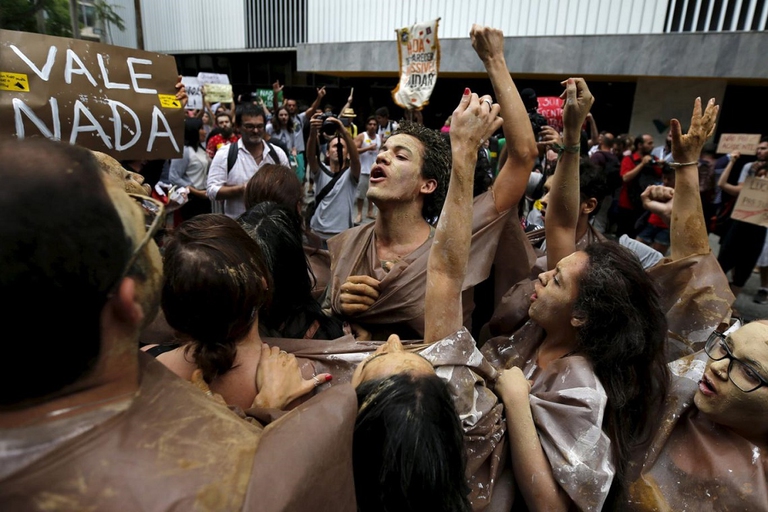
South African court dismisses a major lawsuit by 140,000 Zambian women and children against Anglo American for Kabwe lead poisoning. A setback for affected communities enduring the lasting impact of lead contamination.
It’s been nearly four months since the dam disaster has poisoned Brazil, representing the worst environmental catastrophe in the country’s history and one of the world’s harshest. On 5 November, two dams collapsed in Minas Gerais region, South-eastern Brazil, spilling tonnes of toxic mud and killing 19 people. The area has been devastated, in particular the Doce
It’s been nearly four months since the dam disaster has poisoned Brazil, representing the worst environmental catastrophe in the country’s history and one of the world’s harshest. On 5 November, two dams collapsed in Minas Gerais region, South-eastern Brazil, spilling tonnes of toxic mud and killing 19 people. The area has been devastated, in particular the Doce River, one of Brazil’s largest watercourses, essential for livelihoods of local communities and for plant and animal species.
Samarco, the mining company responsible for the disaster, owned by mining giants Vale and BHP Billiton, has paid two fines so far: 60 million dollars and 250 million dollars. However, in the aftermath of the tragedy experts estimated that damages had an environmental and social cost of billions of dollars.
The dam burst real impact still remains incalculable, but Brazil’s government requested to Samarco a new compensation of 20 billion Brazilian reals (about 5 billion dollars), as announced on Wednesday by Attorney General Luís Inácio Adams.
The compensation will be used to finance a ten-year programme aimed to restore and recover the environment, said Marilene Ramos, head of Brazil’s environmental protection agency IBAMA. Samarco already submitted a long-term environmental recovery plan on 28 January, which was rejected by IBAMA though.
However, the compensation and the area recovery won’t exclude Samarco from its criminal responsibility. The mining company’s director and a dozen managers are currently charged with environmental disaster, and they could also face murder charges.
Siamo anche su WhatsApp. Segui il canale ufficiale LifeGate per restare aggiornata, aggiornato sulle ultime notizie e sulle nostre attività.
![]()
Quest'opera è distribuita con Licenza Creative Commons Attribuzione - Non commerciale - Non opere derivate 4.0 Internazionale.
South African court dismisses a major lawsuit by 140,000 Zambian women and children against Anglo American for Kabwe lead poisoning. A setback for affected communities enduring the lasting impact of lead contamination.
Controversial African land deals by Blue Carbon face skepticism regarding their environmental impact and doubts about the company’s track record, raising concerns about potential divergence from authentic environmental initiatives.
Majuli, the world’s largest river island in Assam State of India is quickly disappearing into the Brahmaputra river due to soil erosion.
Food imported into the EU aren’t subject to the same production standards as European food. The introduction of mirror clauses would ensure reciprocity while also encouraging the agroecological transition.
Sikkim is a hilly State in north-east India. Surrounded by villages that attracts outsiders thanks to its soothing calmness and natural beauty.
Sikkim, one of the smallest states in India has made it mandatory for new mothers to plant saplings and protect them like their children to save environment
Chilekwa Mumba is a Zambian is an environmental activist and community organizer. He is known for having organized a successful lawsuit against UK-based mining companies.
What led to the Fukushima water release, and what are the impacts of one of the most controversial decisions of the post-nuclear disaster clean-up effort?
Nzambi Matee is a Kenyan engineer who produces sustainable low-cost construction materials made of recycled plastic waste with the aim of addressing plastic pollution and affordable housing.










